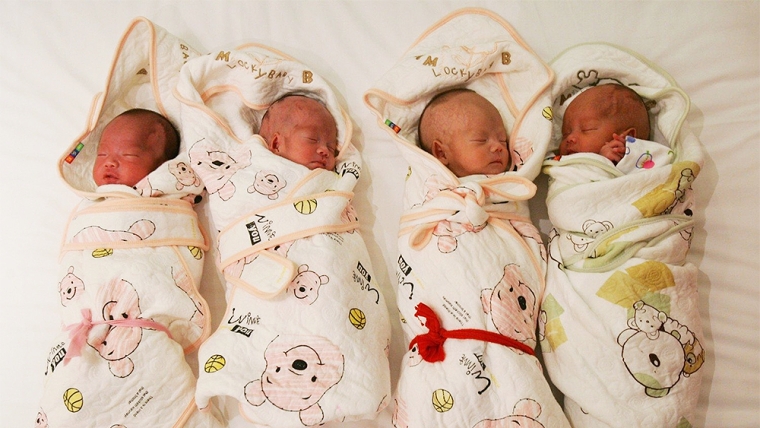
More than four decades after China began opening up to the world, the Chinese government’s decision-making process remains shrouded in secrecy. The country’s population-control policies, and my own ongoing efforts to challenge them, are a case in point.
In 1980, the rocket scientist Song Jian and the economist Tian Xueyuan predicted that China’s population would exceed 4.2 billion by 2080, alarming Chinese authorities and leading to the implementation of the country’s notorious one-child policy. In reality, even without any official restrictions, China’s population would have peaked at roughly 1.6 billion and then gradually declined.
Growing up in China, I personally witnessed the brutality of the one-child policy, which inspired me to initiate a campaign against the country’s population-control measures in 2000. At first, my efforts were restricted to posting articles on overseas websites. I later adopted a more scholarly approach, and by 2003 some of my essays were occasionally allowed to appear in Chinese forums.
In October 2004, a state-controlled newspaper published my article calling for an end to population control, which paved the way for a national discussion about the one-child policy. As my campaign gained traction, senior officials began to take my research seriously. For example, Jin Renqing, China’s finance minister at the time, personally reviewed five of my reports.
In 2007, I published a book in Hong Kong, Big Country With an Empty Nest, challenging the assumptions underlying China’s population-control measures and advocating their immediate end. The book created a stir among family-planning officials and demographers, who tried to belittle and silence my heretical views, and it was quickly banned in China. But the online version received tens of millions of views, defying official efforts to suppress it.
Three years later, an article of mine was included in an anthology titled New Critical Debate on Population Policy as an “opposing” view. With a foreword by Song and articles by Tian and two deputy directors of China’s National Family Planning Commission, the book strongly criticised my work.
For ten years, I was labeled a “traitor” and refrained from traveling to China. But in 2010, I managed to sneak into China’s annual population conference, where one of the drafters of the 1980 open letter that triggered the one-child policy criticised me (his speech was later published). Once my identity was revealed, I was told that the police were searching for me as a suspected troublemaker, prompting me to flee the city overnight.
Over the years, I must have received tens of thousands of requests for help from women facing forced abortions, and I am proud that my efforts have helped to save many babies. To highlight the policy’s human toll, I distributed brochures to almost every member of the national parliament and various provincial and ministerial officials. The responses I received – at least before the government intensified its censorship regime in 2015 – were surprisingly positive.
As it turned out, my predictions were accurate. Nevertheless, when a 50,000-word internal report I wrote was included in 40 Years of Reform: Selected Economic Works – a 2020 collection of 116 reports that had the greatest impact on Chinese policymaking between 1979 and 2018 – my paper was the only one advocating reform of the country’s population-control policy.
For a while, however, the public and academic debates seemed to shift. Between 2010 and 2017, I received more than 100 invitations to speak at China’s top think tanks and universities. Remarkably, some family-planning officials traveled across provinces to attend my lectures.
In 2013, a new edition of Big Country With an Empty Nest was released by a publisher answerable to the Chinese State Council and ranked first among the year’s 100 best books selected by China Publishing Today. As my work received greater recognition, I was invited to the 2016 Boao Forum for Asia conference, China’s answer to the annual World Economic Forum meeting in Davos, as a featured panelist. In a remarkable turnaround, my previously-banned book had become a bestseller and a favourite among policymakers. Once labeled a “traitor,” I had become a distinguished guest of the state.
But my insistence on speaking the truth strained my relations with Chinese officials. In 2016, I told the New York Times that China’s economy could not surpass that of the United States. This infuriated family-planning officials, who successfully lobbied the central government to put me on China’s official blacklist. I further angered the authorities by pointing out that China’s population had been vastly overestimated and, in fact, had started declining in 2018.
Rather than heed my advice and completely lift all population-control measures, China’s leadership adopted a cautious approach. In 2014, China implemented a selective two-child policy, allowing couples to have two children if one of the parents was an only child. This was followed by the introduction of a universal two-child policy in 2016. Finally, in 2021, China allowed parents to have up to three children. Unfortunately, these measures were too limited and came too late to make a significant difference.
China is still on the wrong track, partly because of fears raised by official demographic projections that suggested that if the one-child policy were to remain in place, the fertility rate would stabilise at 1.8, and the population would peak at 1.5 billion in 2033. These projections also estimated that if all couples were allowed to have two children, the population would peak at 1.6 billion by 2044, and the fertility rate would increase to 4.4-4.5 births per woman.
We now know that all these predictions, much like the ones made in 1980 to justify the one-child policy, are nonsense. Even according to China’s exaggerated official figures, the country’s population began to decline in 2022, with the fertility rate falling to 1.0.
In reflecting on my experiences of challenging China’s population-control policies over the past quarter-century, I find some solace in the fact that my estimates have been vindicated. On the other hand, it deeply saddens me that China has persistently disregarded sound research, leading the country into a nightmarish demographic trap and a looming humanitarian catastrophe that could have profound implications for the global economy.
*Yi Fuxian, a senior scientist in obstetrics and gynecology at the University of Wisconsin-Madison, is the author of Big Country with an Empty Nest. Copyright 2023 Project Syndicate, here with permission.
17 Comments
He's a fool. More accurately, he has been trained in a silo, and is ignorant of anything outside it.
And he clearly believes the economics silo - which assumes an infinite planet.
Why are we giving such nonsense oxygen, at this late, overshot point in the human-species trajectory?
forced abortions? c'mon pdk - population control can only happen through education and freely made choices. war, on the other hand, or starvation, or mass heat deaths might do it.
I know you have a one dimensional view of the world but I'm surprised you would label him a fool. After all it appears his predictions have been vindicated.
I can only assume you are pro one child per couple and forced abortions? That would certainly cause a population collapse!
My partner and I discussed our moral-obligation options; 2, 1, or 0. We chose - selfishly - 2.
That was 37 years ago - I have no tolerance for ignorance, this late in the piece.
james108,
Sadly, for all his knowledge, PDK believes that the earth's carrying capacity is at most 2billion. Since we are now over 8 billion and still rising, that means that well over 6 billion people must no longer exist and since he also believes that societal collapse will happen in 2050(see the book Blip), then a great many must die somehow-and soon. A serious pandemic perhaps?
http://www.paulchefurka.ca/CC_Overshoot.html
Note the date...
I haven’t read the source material, but gut feeling is that many billions only exist because of the luxury of fossil fuels (via synthetic fertiliser production, large-scale food harvesting and distribution etc). If we truly try to decarbonise globally, including developing countries, then our species will likely go bankrupt. In little ole’ NZ, the figure to eliminate 1% of our carbon emissions is something like $300 million. That’s right, just 1% of “NZ’s emissions”, and that’s the low-hanging fruit. Try telling 100+ million people in rural India to stop burning coal for heat and cooking…
My point is (and PDK’s point) is that something’s gotta give, whether that be the total population, or the climate, or both.
Wow, how many "I"s, "me"s and "my"s in that article?!
With more than 20% youth unemployment right now they obviously have no use for the young people they have.
Regardless of government policy that's a recipe for birthrates to plummet further.
Extremely high property and education costs (sound familiar) have led many well off to choose to have only 1 child, such that they can spoilt them.
What was once a legislative construct is now as much an economic one.
By design?…
China's recent demographic trends parallel very similar trends across much of North Asia including Japan, South Korea and Taiwan. Accordingly, it is flawed thinking to try and describe the Chinese current situation solely in terms of Chinese Government policies. In any case, those policies now allow three children per family.
KeithW
Agreed. In peasant times, children were an insurance, and given their odds of dying early, the more the better. That approach, ex fossil energy, got humanity to 1 billion, circa 1800.
Now, children are a cost, because the economic system has commodified the Commons - including the unpaid in-family support of old. It requires both parents out working, for starters
A population decline makes sense. It has happened in the past - Ireland went from 8 million living on the edge of starvation to about 5 million living a fairly pleasant life and plentiful food.
Being a heretic (about family-planning) in China is as difficult as being a heretic (Covid treatment and policy) in China. The 6 o'clock news tonight labelling ex-ACT candidates as 'extremists' when the phrase minority-view skeptics would be better.
Compared to India, Africa, and south america , I would not say it has been a failure.
.

We welcome your comments below. If you are not already registered, please register to comment
Remember we welcome robust, respectful and insightful debate. We don't welcome abusive or defamatory comments and will de-register those repeatedly making such comments. Our current comment policy is here.